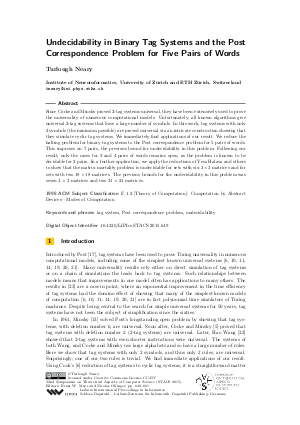Undecidability in Binary Tag Systems and the Post Correspondence Problem for Five Pairs of Words
Author Turlough Neary
-
Part of:
Volume:
32nd International Symposium on Theoretical Aspects of Computer Science (STACS 2015)
Part of: Series: Leibniz International Proceedings in Informatics (LIPIcs)
Part of: Conference: Symposium on Theoretical Aspects of Computer Science (STACS) - License:
 Creative Commons Attribution 3.0 Unported license
Creative Commons Attribution 3.0 Unported license
- Publication Date: 2015-02-26
File

PDF
LIPIcs.STACS.2015.649.pdf
- Filesize: 0.6 MB
- 13 pages
Document Identifiers
Subject Classification
Keywords
- tag system
- Post correspondence problem
- undecidability
Metrics
- Access Statistics
-
Total Accesses (updated on a weekly basis)
0Document
0Metadata
Abstract
Since Cocke and Minsky proved 2-tag systems universal, they have been extensively used to prove the universality of numerous computational models. Unfortunately, all known algorithms give universal 2-tag systems that have a large number of symbols. In this work, tag systems with only 2 symbols (the minimum possible) are proved universal via an intricate construction showing that they simulate cyclic tag systems. We immediately find applications of our result. We reduce the halting problem for binary tag systems to the Post correspondence problem for 5 pairs of words. This improves on 7 pairs, the previous bound for undecidability in this problem. Following our result, only the cases for 3 and 4 pairs of words remains open, as the problem is known to be decidable for 2 pairs. In a further application, we apply the reductions of Vesa Halava and others to show that the matrix mortality problem is undecidable for sets with six 3 x 3 matrices and for sets with two 18 x 18 matrices. The previous bounds for the undecidability in this problem was seven 3 x 3 matrices and two 21 x 21 matrices.
Cite As Get BibTex
Turlough Neary. Undecidability in Binary Tag Systems and the Post Correspondence Problem for Five Pairs of Words. In 32nd International Symposium on Theoretical Aspects of Computer Science (STACS 2015). Leibniz International Proceedings in Informatics (LIPIcs), Volume 30, pp. 649-661, Schloss Dagstuhl – Leibniz-Zentrum für Informatik (2015)
https://doi.org/10.4230/LIPIcs.STACS.2015.649
BibTex
@InProceedings{neary:LIPIcs.STACS.2015.649,
author = {Neary, Turlough},
title = {{Undecidability in Binary Tag Systems and the Post Correspondence Problem for Five Pairs of Words}},
booktitle = {32nd International Symposium on Theoretical Aspects of Computer Science (STACS 2015)},
pages = {649--661},
series = {Leibniz International Proceedings in Informatics (LIPIcs)},
ISBN = {978-3-939897-78-1},
ISSN = {1868-8969},
year = {2015},
volume = {30},
editor = {Mayr, Ernst W. and Ollinger, Nicolas},
publisher = {Schloss Dagstuhl -- Leibniz-Zentrum f{\"u}r Informatik},
address = {Dagstuhl, Germany},
URL = {https://drops.dagstuhl.de/entities/document/10.4230/LIPIcs.STACS.2015.649},
URN = {urn:nbn:de:0030-drops-49486},
doi = {10.4230/LIPIcs.STACS.2015.649},
annote = {Keywords: tag system, Post correspondence problem, undecidability}
}
Author Details
References
-
Vincent D. Blondel and John N. Tsitsiklis. When is a pair of matrices mortal? Information Processing Letters, 63(5):283-286, 1997.

-
Vincent D. Blondel and John N. Tsitsiklis. A survey of computational complexity results in systems and control. Automatica, 36(9):1249-1274, 2000.

-
Julien Cassaigne and Juhani Karhumäki. Examples of undecidable problems for 2-generator matrix semigroup. TCS, 204(1-2):29-34, 1998.

-
Volker Claus. Some remarks on PCP(k) and related problems. Bull. EATCS, 12:54-61, 1980.

-
John Cocke and Marvin Minsky. Universality of tag systems with P = 2. Journal of the ACM, 11(1):15-20, 1964.

-
Matthew Cook. Universality in elementary cellular automata. Complex Systems, 15(1):1-40, 2004.

-
Andrzej Ehrenfeucht, Juhani Karhumäki, and Grzegorz Rozenberg. The (generalized) Post correspondence problem with lists consisting of two words is decidable. TCS, 21(2):119-144, 1982.

-
Vesa Halava and Tero Harju. Mortality in matrix semigroups. American Mathematical Monthly, 108(7):649-653, 2001.

-
Vesa Halava, Tero Harju, and Mika Hirvensalo. Undecidability bounds for integer matrices using Claus instances. IJFCS, 18(5):931-948, 2007.

-
Tero Harju and Maurice Margenstern. Splicing systems for universal Turing machines. In DNA 10, volume 3384 of LNCS, pages 149-158. Springer, 2005.

-
Kristian Lindgren and Mats G. Nordahl. Universal computation in simple one-dimensional cellular automata. Complex Systems, 4(3):299-318, 1990.

-
Yuri Matiyasevich and Géraud Sénizergues. Decision problems for semi-Thue systems with a few rules. TCS, 330(1):145-169. (An earlier version appeared in "11th Annual IEEE Symposium on Logic in Computer Science, LICS 1996".), 2005.

-
Marvin Minsky. Recursive unsolvability of Post’s problem of "tag" and other topics in theory of Turing machines. Annals of Mathematics, 74(3):437-455, 1961.

-
Marvin Minsky. Size and structure of universal Turing machines using tag systems. In Recursive Function Theory: Proceedings, Symposium in Pure Mathematics, volume 5, pages 229-238, Provelence, 1962. AMS.

-
Turlough Neary and Damien Woods. P-completeness of cellular automaton Rule 110. In ICALP 2006, Part I, volume 4051 of LNCS, pages 132-143. Springer, 2006.

-
Michael S. Paterson. Unsolvability in 3× 3 matrices. Studies in Applied Mathematics, 49(1):105-107, 1970.

-
Emil L. Post. Formal reductions of the general combinatorial decision problem. American Journal of Mathematics, 65(2):197-215, 1943.

-
Emil L. Post. A variant of a recursively unsolvable problem. Bulletin of The American Mathematical Society, 52:264-268, 1946.

-
Raphael M. Robinson. Undecidability and nonperiodicity for tilings of the plane. Inventiones Mathematicae, 12(3):177-209, 1971.

-
Yurii Rogozhin. Small universal Turing machines. TCS, 168(2):215-240, 1996.

-
Paul Rothemund. A DNA and restriction enzyme implementation of Turing machines. In DNA Based Computers, volume 27 of DIMACS, pages 75-119. AMS, 1996.

-
Hao Wang. Tag systems and lag systems. Mathematical Annals, 152:65-74, 1963.

-
Damien Woods and Turlough Neary. On the time complexity of 2-tag systems and small universal Turing machines. In 47^th Annual IEEE Symposium on Foundations of Computer Science, pages 439-448, 2006.

